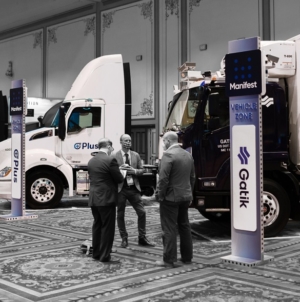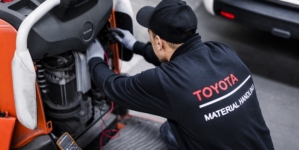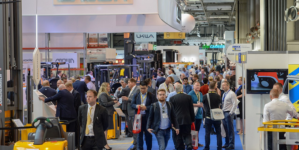-
ROSSLARE EUROPORT TARGETS HEALTH & SAFETY WITH CAMERA TELEMATICS PARTNERSHIP - 2 days ago
-
Landmark Study Reveals Wearable Robotics Significantly Boost Safety and Efficiency in Industrial Environments - July 24, 2024
-
Visku Tackle The Retail Seasonality Challenge One Pallet At A Time - July 22, 2024
-
KAMMAC AND BERGEN LOGISTICS STRENGTHEN FASHION & LIFESTYLE SERVICES IN THE UK - July 19, 2024
-
TENTBOX EXTENDS PARTNERSHIP WITH ARROWXL TO SUPPORT INCREASING DEMAND - July 17, 2024
-
The Perfume Shop improves customer journeys while driving profitability in partnership with Scurri - July 17, 2024
-
ZEROMISSION SECURES £2.3M ($3M) INVESTMENT TO ACCELERATE ELECTRIC FLEETS - July 16, 2024
-
BCMPA CELEBRATES SUCCESS OF 2024 CONFERENCE - July 15, 2024
-
Best of the Best: Jungheinrich Celebrates Triple International Award Win - July 12, 2024
-
GOPLASTICPALLETS.COM CALLS ON NEW CHANCELLOR RACHEL REEVES TO CONSIDER PLASTIC PACKAGING TAX REFORM - July 10, 2024
Uk Must Invest In Electric Charging Infrastructure For Clean Van Commitment To Work.
Switching deliveries to electric vehicles will only be achieved if significant investment is made in the national charging infrastructure and the costs of electric vehicles is reduced significantly, according to Britain’s largest and most influential business organisation in the logistics sector. According to FTA, which represents more than 17,000 business across the industry, the Government’s Clean Van Commitment, to be launched this week (w.c 10 September 2018) must support business in switching its vehicles to electrically powered ones.
Sixteen of the UK’s fleet operators, including FTA members Tesco, Network Rail and Anglian Water, will launch the new scheme at the Zero Emission Vehicle Summit in Birmingham tomorrow. Backed by the Department of Transport, the coalition hopes to encourage manufacturers to increase investment in electric vehicles and inspire their widespread adoption and commit to replace 18,000 diesel vans on Britain’s roads with electric vehicles by 2028.
Denise Beedell , Policy Manager for Vans and Urban Transport at FTA commented: “The Clean Van Commitment sends a strong signal to the industry: green van fleets are in demand and both drivers and operators are willing to switch to lower-emission models. As a sector, logistics is making many positive changes to its environmental impact, and FTA is proud to see so many of its members have joined the coalition. These businesses are leading the sector in environmentally-friendly initiatives, but to achieve significant breakthrough across the industry, there must be more commitment and support from government. FTA is keen to work with government and operators to ensure that the vans sector can continue to deliver for British business and industry while achieving significant reductions in emissions and other environmental impacts.”
“While the initiative is a positive step towards reducing emissions levels, our members are concerned that electricity supply to commercial premises needs to be improved if mass numbers of vans are to be able to convert to electric. There is currently insufficient charging infrastructure in place for electric vehicles to be adopted on such a large scale. And with the higher price of electric models, and no incentive to switch from conventionally fuelled vehicles, there has to be more work done to ensure it is an affordable and realistic option for businesses of all sizes.”
For more information on FTA Please Visit
Efficient logistics is vital to keep Britain trading, directly having an impact on more than seven million people employed in the making, selling and moving of goods. With Brexit, new technology and other disruptive forces driving change in the way goods move across borders and through the supply chain, logistics has never been more important to UK plc. A champion and challenger, FTA speaks to Government with one voice on behalf of the whole sector, with members from the road, rail, sea and air industries, as well as the buyers of freight services such as retailers and manufacturers.
[tpr-boilerplate company=’52’]

































